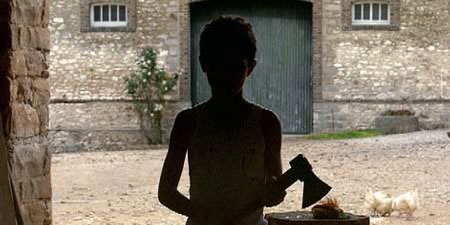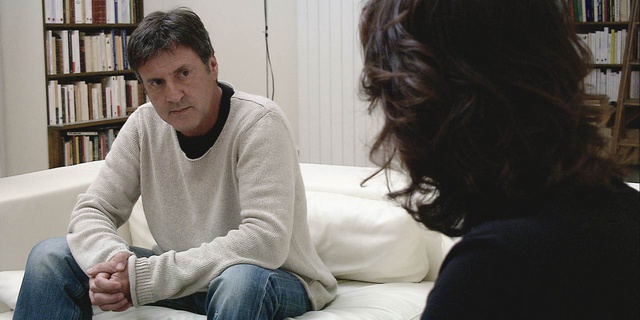
The second half of last night’s double-feature, Michael Haneke’s Cache, offered a moral universe in many ways diametrical to that of Match Point — here, even the long-buried sins of the upper crust are eventually exposed before the Great Eye. As I said in the 2005 round-up, last year was a banner year for politically-minded movies, and Cache, both an unsettling thriller of personal surveillance and a timely rumination on First World comforts and complicity in an age of terror, definitely ranks among them. With its inordinately protracted (and sometimes intentionally confusing) shots and its refusal to answer many of the questions it poses (including the plot device driving the film), Cache isn’t going to be everyone’s cup of tea, and I’m sure some will write it off as just a pretentious and inscrutable foreign film. Nevertheless, I thought Cache was well worth seeing. It’s a film that, both visually and politically, will put you ill at ease.
Cache begins with a long, steady image of a Parisian street, held throughout the very slowly typed-out credits and beyond. Well after the normal amount of time our movie-conditioned eye allots for a basic establishing shot (by now, Tony Scott would have had an embolism), the image is suddenly paused, and then rewound. As it turns out, we’ve been viewing a tape, one featuring –and sent to — the home of the Laurents, along with a scrawled picture of a child vomiting blood. (Yes, it starts like Lost Highway, but they’re very different movies.) Georges (Daniel Auteuil), the host of his own popular Charlie Rose-ish television show, is nonplussed by this bizarre tape, and his wife Anne (Juliette Binoche), a successful book agent, is driven to distraction, particularly as more cassettes (with more information) arrive, and it becomes increasingly clear that Georges has some sense of why this is happening. Soon, for the sake of his wife and 12-year-old son Pierrot (Lester Makedonsky), Georges is forced to follow the path prescribed by these strange missives, and to confront a dark moment in his past that he, his parents, and arguably his nation have purposefully forgotten.
What that dark moment is is for you to discover, although it’s one that (as political analogy — it doesn’t work quite as well in terms of straight narrative) hearkens to the French-Algerian conflict and, more broadly, the war on terror and the hidden costs and benefits of colonialism. Georges rages and fumes throughout the movie, insisting over and over that he and his family are being terrorized. But by whom, and for what? Is Georges really blameless, and, that question aside, are his responses appropriate? Some very brief flashes of didacticism aside (for example, the scene involving CNN), Cache generally posits troubling questions about national memory, the dividends of empire, and the state of the world today without telling us how to feel about them.
Another layer of unease in the film involves the aforementioned camerawork. Cache returns to that exterior view of the Laurents’ home several times, and we never know if we’re watching “just” an establishing shot or indulging in the stalker’s-eye-view. (The likely answer, a la Rear Window, is that we’re doing both.) This goes for almost every scene in the film, and the cumulative experience of “stalking” the Laurents for two hours adds to the apprehension and foreboding of Cache. We begin to feel complicit in this crime of surveillance, just as, in time, we come to feel complicit in the Laurents’ sins. (Sure, the question of “the gaze” is a hoary staple of any Film 101 class — still, Haneke manages here to move past arthouse histrionics and create something that feels genuinely creepy.)
Finally, as I said above, Cache is disarmingly open-ended, particularly by the “explain-everything-several-times” standard we’re used to. Yes, one character’s arc is made clear, I think, by his/her womb-like retreat from the world, and that maddening last shot, if you caught the action (screenshot spoilers here), does suggest a possible answer to the cassette issue. But, ultimately, the bullet-points of the thriller story aren’t all that important. The plot mechanics of Cache may remain hidden, but the unsettling impressions of guilt and complicity it leaves linger in plain sight.

